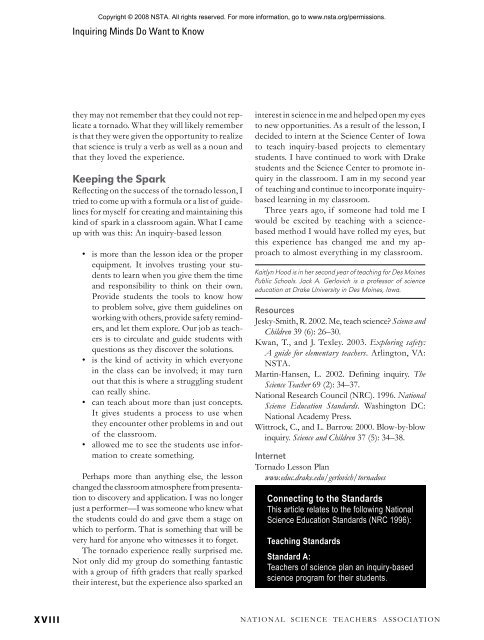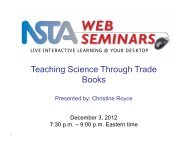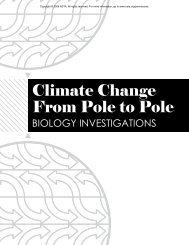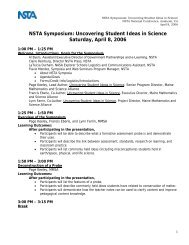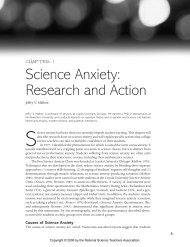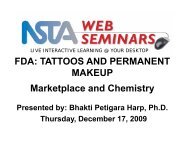Copyright © 2008 NSTA. All rights reserved. For more information ...
Copyright © 2008 NSTA. All rights reserved. For more information ...
Copyright © 2008 NSTA. All rights reserved. For more information ...
You also want an ePaper? Increase the reach of your titles
YUMPU automatically turns print PDFs into web optimized ePapers that Google loves.
xviii<br />
<strong>Copyright</strong> <strong>©</strong> <strong>2008</strong> <strong>NSTA</strong>. <strong>All</strong> <strong>rights</strong> <strong>reserved</strong>. <strong>For</strong> <strong>more</strong> <strong>information</strong>, go to www.nsta.org/permissions.<br />
Inquiring Minds Do Want to Know<br />
they may not remember that they could not replicate<br />
a tornado . What they will likely remember<br />
is that they were given the opportunity to realize<br />
that science is truly a verb as well as a noun and<br />
that they loved the experience .<br />
Keeping the Spark<br />
Reflecting on the success of the tornado lesson, I<br />
tried to come up with a formula or a list of guidelines<br />
for myself for creating and maintaining this<br />
kind of spark in a classroom again . What I came<br />
up with was this: An inquiry-based lesson<br />
• is <strong>more</strong> than the lesson idea or the proper<br />
equipment . It involves trusting your students<br />
to learn when you give them the time<br />
and responsibility to think on their own .<br />
Provide students the tools to know how<br />
to problem solve, give them guidelines on<br />
working with others, provide safety reminders,<br />
and let them explore . our job as teachers<br />
is to circulate and guide students with<br />
questions as they discover the solutions .<br />
• is the kind of activity in which everyone<br />
in the class can be involved; it may turn<br />
out that this is where a struggling student<br />
can really shine .<br />
• can teach about <strong>more</strong> than just concepts.<br />
It gives students a process to use when<br />
they encounter other problems in and out<br />
of the classroom .<br />
• allowed me to see the students use <strong>information</strong><br />
to create something .<br />
Perhaps <strong>more</strong> than anything else, the lesson<br />
changed the classroom atmosphere from presentation<br />
to discovery and application . I was no longer<br />
just a performer—I was someone who knew what<br />
the students could do and gave them a stage on<br />
which to perform . That is something that will be<br />
very hard for anyone who witnesses it to forget .<br />
The tornado experience really surprised me .<br />
Not only did my group do something fantastic<br />
with a group of fifth graders that really sparked<br />
their interest, but the experience also sparked an<br />
interest in science in me and helped open my eyes<br />
to new opportunities . As a result of the lesson, I<br />
decided to intern at the Science Center of Iowa<br />
to teach inquiry-based projects to elementary<br />
students . I have continued to work with Drake<br />
students and the Science Center to promote inquiry<br />
in the classroom . I am in my second year<br />
of teaching and continue to incorporate inquirybased<br />
learning in my classroom .<br />
Three years ago, if someone had told me I<br />
would be excited by teaching with a sciencebased<br />
method I would have rolled my eyes, but<br />
this experience has changed me and my approach<br />
to almost everything in my classroom .<br />
Kaitlyn Hood is in her second year of teaching for Des Moines<br />
Public Schools. Jack A. Gerlovich is a professor of science<br />
education at Drake University in Des Moines, Iowa.<br />
resources<br />
Jesky-Smith, R . 2002 . Me, teach science? Science and<br />
Children 39 (6): 26–30 .<br />
Kwan, T ., and J . Texley . 2003 . Exploring safety:<br />
A guide for elementary teachers . Arlington, VA:<br />
<strong>NSTA</strong> .<br />
Martin-Hansen, L. 2002. Defining inquiry. The<br />
Science Teacher 69 (2): 34–37 .<br />
National Research Council (NRC) . 1996 . National<br />
Science Education Standards . Washington DC:<br />
National Academy Press .<br />
Wittrock, C ., and L . Barrow . 2000 . Blow-by-blow<br />
inquiry . Science and Children 37 (5): 34–38 .<br />
internet<br />
Tornado Lesson Plan<br />
www.educ.drake.edu/gerlovich/tornadoes<br />
Connecting to the Standards<br />
This article relates to the following National<br />
Science Education Standards (NRC 1996):<br />
Teaching Standards<br />
Standard A:<br />
Teachers of science plan an inquiry-based<br />
science program for their students.<br />
NATIoNAL SCIENCE TEACHERS ASSoCIATIoN


